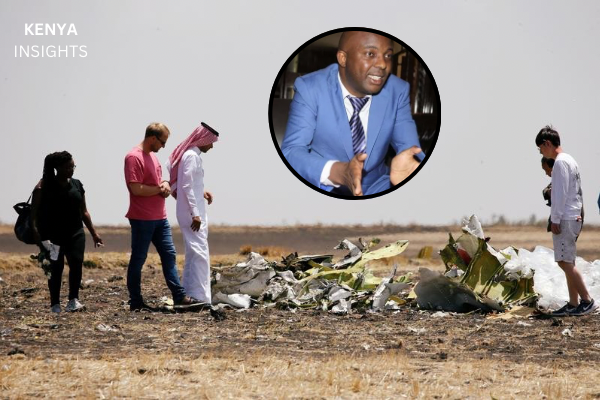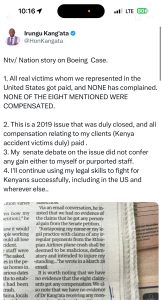
Kang’ata Entangled in Ethiopian Air Crash Compensation Scandal
In a potential scandal that could shake Kenya to its core, Murang’a Governor Dr. Irungu Kang’ata is facing serious allegations of masterminding a fraudulent scheme linked to the tragic 2019 Ethiopian Airlines crash, which resulted in the loss of 157 lives.
An investigation by Nation Media Group has revealed troubling evidence indicating that, during his tenure as Senator, Kang’ata may have enlisted his own staff to impersonate relatives of the victims in a bid to siphon off millions from the compensation fund.
On March 10, 2019, Ethiopian Airlines Flight 302, a Boeing 737-8 aircraft, crashed near Bishoftu shortly after takeoff from Bole International Airport, killing all aboard.
Among the victims were 36 Kenyans—32 holding Kenyan passports and four with dual citizenship.
The disaster left families devastated and triggered massive litigation against Boeing.
At the center of the controversy is a petition submitted to the Senate in 2019, ostensibly by eight individuals claiming to have lost family members in the crash.
The petition’s opening line stated: “On March 10, 2019, we lost our family members in the ill-fated Ethiopian Airlines crash.”
The petitioners claimed they hadn’t received “basic support for counselling” or been able to “retrieve our loved ones’ remains for burial.”
They also alleged difficulties obtaining death certificates.
In a stunning revelation, these eight petitioners were employees working under then-Senator Kang’ata.
Two of them—Davis Mburu Karanja and another who cannot be named due to a legal injunction—confirmed this in a November 2024 letter to the Senate Clerk, stating: “All the eight petitioners were employees of the former Senator for Murang’a County.”
When the petition was presented to the Senate, it was initially assigned to the National Security committee but was later transferred to the Justice, Legal Affairs and Human Rights committee—where Dr. Kang’ata was a member.
This unusual transfer raises questions about potential manipulation of the process.
During a Senate session on July 2, 2019, Dr. Kang’ata acknowledged his connection to the petitioners: “I am one of the lawyers who are handling that matter. Secondly, indeed, the petitioners behind this petition are personally known to me.”
He admitted advising them to submit the petition but claimed he “did not want to participate in person, because of potential conflict of interest issues.”
What he failed to disclose was that these petitioners were his employees.
What followed was equally troubling.
A delegation including Dr. Kang’ata and Nandi Senator Samson Cherargei traveled to Seattle, USA, on taxpayers’ money, ostensibly to investigate issues raised in the petition.
When the committee finally presented its report—853 days after the petition was filed—it contained no recommendations whatsoever.
This prompted outrage from several senators.
Then Bungoma Senator Moses Wetang’ula remarked: “It’s distressing to hear that they spent public resources to go to Seattle in the US and then bring no finding.”
Vihiga Senator George Khaniri questioned: “I want to know why the committee had to take a trip to Seattle to establish if death certificates were issued or not in Kenya.”
NTV’s investigations revealed disturbing inconsistencies in the petitioners’ claims.
When the reporters visited the homes of petitioners Eliud Maina Wanja and Noah Gachucha Gachanja in Murang’a County, neighbors and family members expressed shock at their names being connected to the crash.
At Mr. Maina’s home in Matharite village, an elderly woman named Jane Njeri reacted with surprise: “Kwa hii boma? Sijawahi sikia (In this home? I’ve never heard).”
The area assistant chief also denied any death having occurred from the Ethiopian accident.
Similarly, at Mr. Gachucha’s home in Karung’e village, his younger brother Stanley Kamau was visibly shocked, stating he had never heard of a family burial related to a plane crash victim.
One of the petitioners, Davis Mburu Karanja, who has since left the governor’s employment, now claims: “I don’t know even how my name got on the petition.”


Leave a Reply